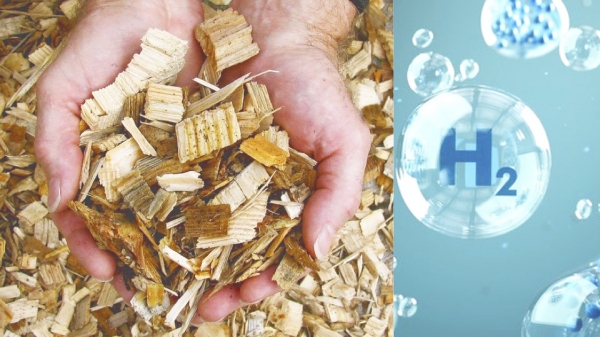
Wood waste, a common problem for many industries, can now be processed to become hydrogen. Professor Dong-Pyo Kim and Ph.D. candidate Se-jun Lim of the Department of Chemical Engineering (CE) conducted joint research with Prof. Jung-ki Ryu and Ph.D. candidate Hyun-Myung Oh of the Department of Energy and Chemical Engineering at UNIST to develop a chemical process that can turn wood waste into hydrogen and high-value chemical products.
The product of this chemical process includes vanillin, a raw material in multiple food and pharmaceutical products. Not only this, but the process also does not produce any carbon dioxide (CO2).
Most hydrogen production processes currently used make ‘grey hydrogen’ which is hydrogen that also produces CO2. This creates an ironic situation where CO2, the main culprit of global warming, is produced to create an eco-friendly energy source. One alternative, which produces green hydrogen using water electrolysis, was in the limelight but this process requires excessive amounts of electrical energy resulting in high production costs and the possibility of explosion.
The research team used inexpensive molybdenum (Mo) based catalysts to decompose wood waste into green hydrogen. The reactivating process of a deactivated catalyst is the main principle of producing hydrogen. The catalyst also forms vanillin during the reaction. This technology substantially reduced the processing time to 30 minutes from its prior limit of 12 hours by utilizing microfluidics to maximize the efficiency in transferring materials and heat. Another advantage of this new technology is that the successive separation process can prevent electrodes from contamination through unwanted side products while the decomposition of wood waste can automatically reactivate the catalysts through continuous reactions.
Through research, the research team concluded that the new process consumes less than half of the power needed for the water electrolysis process which reduces the cost greatly and is free from the possible dangers of explosions. This research benefits both the economy and society by utilizing useless wood waste to produce hydrogen and other high-valued chemical products with low cost.
This research was published in Advanced Science and was funded by the National Research Foundation of Korea’s directorate for basic research in science and engineering.


